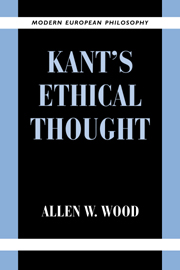7 - The history of human nature
Published online by Cambridge University Press: 05 June 2012
Summary
Herder vs. Kant
Kant became interested in the philosophy of history at about the time he first articulated his mature moral philosophy in the Groundwork. It is reasonable to conjecture that this is no mere coincidence. As we have already seen, some of the arguments of the Groundwork, especially toward the beginning of both the First and Second Sections, depend significantly on Kant's theory of human nature and history. More generally, the Groundwork articulates a moral philosophy suited to Kant's philosophy of history and to the time in history in which he saw himself as living.
The rise in Kant's interests in both history and moral philosophy also occurred at the same time he was becoming critically engaged with the highly original historical reflections of his former student Johann Gottfried Herder (1744–1803). Herder had studied with Kant between 1762 and 1765, but while in Konigsberg he had also come under the influence of Kant's eccentric friend Johann Georg Hamann (1730–1788). Hamann's views on reason, religion, science, and society were very much at odds with those of the Enlightenment. Herder subsequently rose to prominence as a writer on a wide variety of topics and as a critic of Enlightenment thought, especially its views of society and history. His greatest work, Ideas for the philosophy of history of humanity, was published in several volumes beginning in 1784.
- Type
- Chapter
- Information
- Kant's Ethical Thought , pp. 226 - 249Publisher: Cambridge University PressPrint publication year: 1999

